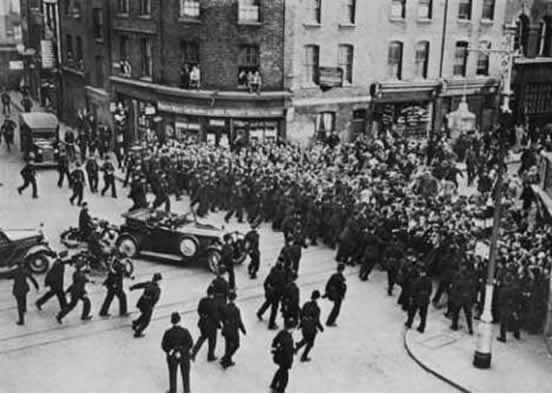Brown, Frederick. The Embrace of Unreason: France 1914-1940, Alfred A. Knopf, New York, 2013 (345pp.$28.95)
On May 16, 1915, one of the largest crowds ever to gather on Paris’ Place des Pyramides honored Joan of Arc, Catholic heroine in the long French war against the English during the 14th century. For decades a movement composed of monarchists, right wing Catholics, and super patriots had urged that “dream govern movement,” a short-handed ideology concerning the “supernatural” or “superhuman” spirit of a woman whose being embodied France herself. That May, while carnage reigned on the Western Front, some 15,000 French pilgrims jammed St. Peter’s Basilica on the occasion of Joan’s canonization, under panels depicting the many miracles attributed to the new saint. A trainload of French legislators attended, along with 69 French bishops, and Gabriel Hanotaux, French ambassador extraordinary to the Vatican. Pope Benedict XV made May 30 Joan’s feast day.
The masterful historian Frederick Brown knows France as few historians know any subject. As the author of “For the Soul of France,” “Zola” and a biography of Flaubert (which was a finalist for the National Book Critics Circle Award), Brown has undertaken to understand Europe’s dark follies, partially exemplified by the cult of Joan, but encompassing a decades long entrancement by anti-Semitism, xenophobia, militarism, fascism and super patriotism. Coupled with such intellectual foibles as Surrealism and Futurism, and heated by misinterpretations of philosophers like Nietzsche and Bergson, the French fatally poisoned themselves and their society, arriving at the ultimate dead-end, when during the Paris World’s Fair of 1937, the massive stone pavilions of the Soviet Union and Nazi Germany stood facing one another across a wide promenade.
These grotesque ironies, and many others, make for compelling reading, especially when recounted by a writer as meticulous and sweeping as Brown. Brown wisely chooses a focus for his book—the lives of writers and politicos Maurice Barres, Charles Maurras, and Pierre Drieu La Rochelle, each exemplifying a facet of “unreason,” Perhaps super patriotism (Barres), race hate and violence (Maurras) and collaboration coupled with anti-Semitism (Drieu). “The Embrace of Unreason” picks up where “For the Soul of France” left off, with the Dreyfus Affair. Brown clearly demonstrates how French politicians and intellectuals gradually abandoned their Enlightenment roots, a grounding in reason, universalism and Kantian morality, and rejected bourgeois decadence.
What resulted in France during the fateful years between wars was a descent into an irrational fervor of “soil and blood,” brought on partly by the desire for vengeance from the defeat by Prussians in 1871, and partly by a steadily advancing spy paranoia, numerous financial and political scandals, and fear of Hitler. The glorification of uniforms was soon to follow, as was hatred of Jews, foreigners and socialists. Pretty soon right-wing militias were marching in the streets of Paris and a full-fledged fascist party of enormous influence was born. Circling all this like a batch of ragged buzzards were the Surrealists and Futurists, always ready to make mincemeat of society.
The names of the famous are many: Leon Blum, Jean-Paul Sartre, the writers Collette and Andre Malraux, along with artists like Man Ray and Marcel Duchamp, and politicians like Marshal Petain. With his meticulous scholarship and flavorful writing style, Brown evokes a dreadful era with great care. Not only a mine of detailed historical information, the book is replete with excellent photographs and a fine index.
Typical of the age was Barres’ dogmas and imaginings; that diasporic Jews with shallow roots were susceptible to treason, that trench warfare was consecrated in glory, that France was holy and exceptional, that, in the words of Petain, “The earth does not lie; it will be your refuge.” This drumbeat from long ago we still hear, sometimes not so quietly. It says to us, “put on your uniform, march with us, hate the others, glorify our lands.,..die gladly and unquestioningly for the cause.”


